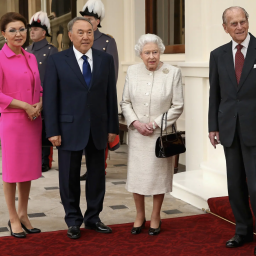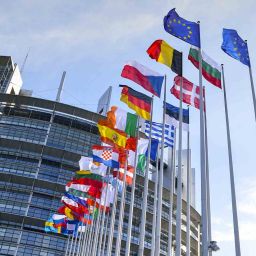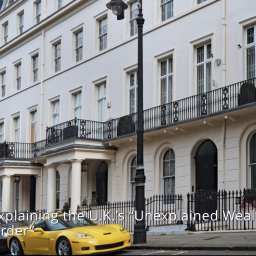The UK’s flawed anti-corruption regime has an impact on its global role. A new round of reforms could help strengthen the rule of law at home and abroad.
The United Kingdom’s approach to corruption often conflicts with its foreign policy. Opaque British financial structures lie at the heart of a money-laundering scandalgathering pace in Denmark, as well as a growing controversy over campaign financein the UK’s vote to leave the European Union. Although concern about these cases has risen sharply in recent weeks, it has deep roots: an inability to control the movement of dark money has long hampered British statecraft. For years, weaknesses in the UK’s anti-corruption regime have inhibited government efforts to promote democracy abroad, distinguish between state and criminal actors, and even defend domestic politics against foreign interference.
After coming under UK sanctions in 2011, allies of the Syrian regime allegedly accessed the international financial system using British banks and the London property market. As the UK disbursed financial aid in a push to reform Nigeria’s military in 2014, Nigerian leaders allegedly diverted government revenue into shell companies in British overseas territories. And, as the UK invoked International Monetary Fund (IMF) obligations to condemn Ukraine’s backsliding on the rule of law in 2016, politicians in Kyiv allegedly channelled state funds into Scottish Limited Partnerships (SLPs). Each time, money-laundering networks helped shape what ECFR’s Connectivity Wars calls “political conflicts [fought] through the system that manages the global economy”.
More visibly, successive British governments have allowed figures linked with kleptocratic, sometimes hostile, regimes to access London’s sprawling ecosystem of professional services firms. An array of accountancy, public-relations, private intelligence, and law firms – along with other trust or companies service providers (TCSPs) – appear to have profited from this acquiescence, as shown in work by the Financial Times, the New Yorker, and Transparency International. The Solicitors’ Regulation Authority recently concluded that only 17 of 50 British law firms under review had implemented, or were implementing, adequate anti-money-laundering measures. According to the National Crime Agency’s last annual assessment, its earlier claim that as much as £90 billion in laundered money affects the UK each year had been a “significant underestimate”. Nonetheless, the UK has begun to reform its anti-corruption regime.
The use of London as a base for the corrupt assets of Kremlin-connected individuals … has implications for our national security
In May, parliament passed the Sanctions and Anti-Money Laundering Act 2018. This wide-ranging legislation combines anti-corruption measures with mechanisms for addressing human-rights abuses and humanitarian crises abroad. Crucially, the bill includes a cross-party amendment to introduce public registers of company beneficial ownership – which list the individuals behind otherwise anonymous firms – in British overseas territories by the end of the decade.
Other positive recent steps include a commitment in January 2018 to introduce public registers of foreign-owned UK property by 2021; the first enforcement of unexplained wealth orders (requiring individuals to prove they acquired their UK assets legally) in March; a declared crackdown on SLPs in April; and a seeming refusal to renew the investor visa of a Russian oligarch shortly thereafter. All this fits with the Anti-Corruption Strategy the UK published, to little fanfare, late last year.
As the visa episode suggests, growing anxiety about a hostile Russia seems to have hastened the UK’s anti-corruption reforms. Earlier this year, a House of Commons Foreign Affairs Committee report concluded: “the use of London as a base for the corrupt assets of Kremlin-connected individuals … has implications for our national security. Combating it should be a major UK foreign policy priority.” Similarly, explaining her sponsorship of the amendment to the May 2018 act, one member of parliament cited an estimate that £68 billion had moved from Russia to British overseas territories in the past decade.
As Clara Portela discusses in a new piece for ECFR, the broader act shares much with the Magnitsky laws introduced in several other Western countries in recent years. These laws are named for Sergei Magnitsky, a lawyer who was killed in custody after uncovering an international fraud scheme that allegedly involved the Russian security services – and who became, in an absurdity worthy of The Master and Margarita, the first dead person to go on trial in post-communist Russia.
Yet it would be a mistake for the UK to pursue anti-corruption measures as merely a response to Russia’s behaviour. As a leak of more than 11 million documents from an offshore law firm showed in 2016, Russia is just one of many hostile states to have allegedly moved large sums of money across borders using opaque British financial structures. By increasing financial transparency through systems such as public registers, the UK can bolster aspects of its foreign policy that rely on control of the financial system.
Given that state-linked corruption networks often depend on nominally independent citizens, greater transparency would also help address concerns about actors who are, as GCHQ’s director recently said of the Kremlin, “blurring the boundaries between criminal and state activity”. So would more stringent oversight of professional services firms. As the Financial Times reported in an investigation into one London-based private intelligence company (employed by a former minister from Kazakhstan), many such firms have “amassed expertise and tradecraft once monopolised by state agencies and put it at the service of tyrants, oligarchs and anyone else willing to pay”.
Growing anxiety about a hostile Russia seems to have hastened the UK’s anti-corruption reforms
Ultimately, the UK’s anti-corruption reforms will only succeed in so far as there is the political will to implement and maintain them. As such, it is worrying that the British government initially opposed the cross-party amendment to the May 2018 act and that the deadlines for introducing overseas and property public registers are so distant. Meanwhile, the omission of crown dependencies from the registers leaves the act with unfinished business.
Hopefully, rumours that the government intends to curb the independence of the Serious Fraud Office are unfounded. But the prosecution earlier this year of a financial secrecy whistle-blower – who exposed inadequate oversight of company formation on the UK mainland (an issue central to the Danish scandal) – suggests a lack of seriousness about reform. As does the fact that, by late last year, Companies House had only six employees to monitor four million British firms.
However, the UK has shown that it can lead its allies on anti-corruption. Despite problems with their implementation, the country’s public registers of company beneficial ownership (introduced on the UK mainland two years ago) appear to have helped push the EU to adopt similar measures as part of its Fifth Anti-Money Laundering Directive. And it is encouraging that the government recently announcedplans to boost the Serious Fraud Office’s core funding by 50 percent.
As witnesses to the Foreign Affairs Committee report argued, a lack of funding often prevents UK anti-corruption units from recruiting staff trained to deal with the kind of complex financial networks that run through many money-laundering schemes. Establishing, as one witness suggested, a more robust system for monitoring cross-border transactions – similar to that in Australia – would also require greater funding and expertise. So would combating an over-reliance on self-reporting in anti-money-laundering measures (TCSPs filed just 77 of the UK’s 400,000 suspicious activity reports in 2016).
Politically, the government has reason to act. British politics still languishes in the shadow of the 2007-2008 financial crisis, which created – as the chair of parliament’s Treasury Select Committee said last year – “a real ‘them and us’ culture” in the UK. This culture is perhaps most visible in the mistrust of a seemingly corrupt elite that helped drive the country’s vote to leave the EU. Indeed, according to a YouGov poll taken in November 2014, the majority of UK citizens sawcorruption as the most significant cause of the financial crisis. A more robust anti-corruption regime would help address the sense of disenchantment that runs through British public life, and that deepens social divisions hostile states sometimes exploit.
In its ongoing global review of corruption, the IMF argues: “when cheating is rewarded, and when elites are seen to play by different rules, trust will give way to cynicism, and social cohesion will fragment.” Such fragmentation may help explain why, as a new ECFR study finds, European policymakers see foreign interference in domestic politics as a growing threat. If the UK is to prevent a greater collapse in trust, it needs to address the perception that impunity is for sale – that, whether for foreign kleptocrats or their domestic enablers, the rule of law only extends so far up the economic ladder.
Londongrad and beyond: UK foreign policy and the fight against corruption










